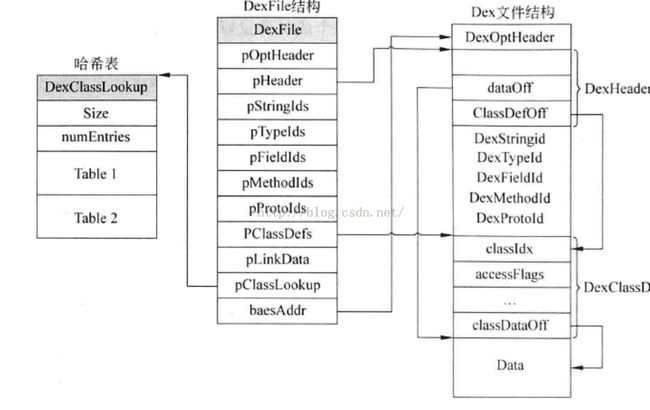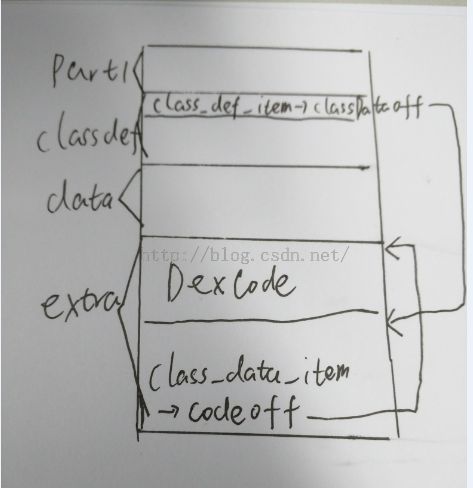DexHunter脱壳神器分析
0x00
这篇文章我们分析Android脱壳神器DexHunter的源代码。DexHunter作者也写了一篇介绍它的文章从Android运行时出发,打造我们的脱壳神器。DexHunter源代码位于https://github.com/zyq8709/DexHunter。
0x01
DexHunter 实现中,只需要修改一处文件:dalvik\vm\native\dalvik_system_DexFile.cpp
下面是BeyondCompare比对:
我们看到DexHunter的代码都位于系统源代码vm目录下,所以要运行DexHunter需要dalvik\vm\native\dalvik_system_DexFile.cpp代码,然后在源码环境下编译,最后刷机运行。
0x02
核心原理请参考从Android运行时出发,打造我们的脱壳神器,简单的从代码角度说,在Dalvik_dalvik_system_DexFile_defineClassNative中插入代码来修复被破坏的dex,原理有两个:
1、在DVM中:
显式加载:
ClassLoader.loadClass对应Dalvik_dalvik_system_DexFile_defineClassNative
Class.forName对应Dalvik_java_lang_Class_classForName
隐式加载:
对应dvmResolveClass
如下图:
第一点说明了时机,也就是为什么在Dalvik_dalvik_system_DexFile_defineClassNative插入代码。
2、执行dvmDefineClass,形成的ClassObject结构体的变量都是有效的。dvmDefineClass会在我们插入的代码中调用,详见后面的分析。
0x03
下面用注释的方式来分析源代码。
分析之前先附上两张图,有助于分析。
图 1
其中baseAddr指向DexHeader的首地址,图中有错误。下文中经常看到mem->addr指向DexOptHeader的首地址。
再附上一张图,分析时会用到:
图 2
//------------------------added begin----------------------//
#include <asm/siginfo.h>
#include "libdex/DexClass.h"
#include <sys/stat.h>
#include <fcntl.h>
#include <sys/mman.h>
static char dexname[100]={0};
static char dumppath[100]={0};
static bool readable=true;
static pthread_mutex_t read_mutex;
static bool flag=true;
static pthread_mutex_t mutex;
static bool timer_flag=true;
static timer_t timerId;
struct arg{
DvmDex* pDvmDex;
Object * loader;
}param;
void timer_thread(sigval_t)
{
timer_flag=false;
timer_delete(timerId);
ALOGI("GOT IT time up");
}
void* ReadThread(void *arg){
FILE *fp = NULL;
while (dexname[0]==0||dumppath[0]==0) {
fp=fopen("/data/dexname", "r");
if (fp==NULL) {
sleep(1);
continue;
}
fgets(dexname,99,fp);//从/data/dexname获取字符串赋值给dexname,github中已经给出了,是/data/data/com.example.seventyfour.tencenttest/files/libmobisecy1.zip,这是用来脱阿里壳子时使用的
dexname[strlen(dexname)-1]=0;
fgets(dumppath,99,fp);//这是生成4个文件的总目录/data/data/com.example.seventyfour.tencenttest/,后面我们会看到4个文件分别是part1,data,classdef,extra
dumppath[strlen(dumppath)-1]=0;
fclose(fp);
fp=NULL;
}
struct sigevent sev;
sev.sigev_notify=SIGEV_THREAD;
sev.sigev_value.sival_ptr=&timerId;
sev.sigev_notify_function=timer_thread;
sev.sigev_notify_attributes = NULL;
timer_create(CLOCK_REALTIME,&sev,&timerId);
struct itimerspec ts;
ts.it_value.tv_sec=5;
ts.it_value.tv_nsec=0;
ts.it_interval.tv_sec=0;
ts.it_interval.tv_nsec=0;
timer_settime(timerId,0,&ts,NULL);
return NULL;
}
void ReadClassDataHeader(const uint8_t** pData,
DexClassDataHeader *pHeader) {
pHeader->staticFieldsSize = readUnsignedLeb128(pData);
pHeader->instanceFieldsSize = readUnsignedLeb128(pData);
pHeader->directMethodsSize = readUnsignedLeb128(pData);
pHeader->virtualMethodsSize = readUnsignedLeb128(pData);
}
void ReadClassDataField(const uint8_t** pData, DexField* pField) {
pField->fieldIdx = readUnsignedLeb128(pData);
pField->accessFlags = readUnsignedLeb128(pData);
}
void ReadClassDataMethod(const uint8_t** pData, DexMethod* pMethod) {
pMethod->methodIdx = readUnsignedLeb128(pData);
pMethod->accessFlags = readUnsignedLeb128(pData);
pMethod->codeOff = readUnsignedLeb128(pData);
}
DexClassData* ReadClassData(const uint8_t** pData) {
DexClassDataHeader header;
if (*pData == NULL) {
return NULL;
}
ReadClassDataHeader(pData,&header);
size_t resultSize = sizeof(DexClassData) + (header.staticFieldsSize * sizeof(DexField)) + (header.instanceFieldsSize * sizeof(DexField)) + (header.directMethodsSize * sizeof(DexMethod)) + (header.virtualMethodsSize * sizeof(DexMethod));
DexClassData* result = (DexClassData*) malloc(resultSize);
if (result == NULL) {
return NULL;
}
uint8_t* ptr = ((uint8_t*) result) + sizeof(DexClassData);
result->header = header;
if (header.staticFieldsSize != 0) {
result->staticFields = (DexField*) ptr;
ptr += header.staticFieldsSize * sizeof(DexField);
} else {
result->staticFields = NULL;
}
if (header.instanceFieldsSize != 0) {
result->instanceFields = (DexField*) ptr;
ptr += header.instanceFieldsSize * sizeof(DexField);
} else {
result->instanceFields = NULL;
}
if (header.directMethodsSize != 0) {
result->directMethods = (DexMethod*) ptr;
ptr += header.directMethodsSize * sizeof(DexMethod);
} else {
result->directMethods = NULL;
}
if (header.virtualMethodsSize != 0) {
result->virtualMethods = (DexMethod*) ptr;
} else {
result->virtualMethods = NULL;
}
for (uint32_t i = 0; i < header.staticFieldsSize; i++) {
ReadClassDataField(pData, &result->staticFields[i]);
}
for (uint32_t i = 0; i < header.instanceFieldsSize; i++) {
ReadClassDataField(pData, &result->instanceFields[i]);
}
for (uint32_t i = 0; i < header.directMethodsSize; i++) {
ReadClassDataMethod(pData, &result->directMethods[i]);
}
for (uint32_t i = 0; i < header.virtualMethodsSize; i++) {
ReadClassDataMethod(pData, &result->virtualMethods[i]);
}
return result;
}
void writeLeb128(uint8_t ** ptr, uint32_t data)
{
while (true) {
uint8_t out = data & 0x7f;
if (out != data) {
*(*ptr)++ = out | 0x80;
data >>= 7;
} else {
*(*ptr)++ = out;
break;
}
}
}
uint8_t* EncodeClassData(DexClassData *pData, int& len)
{
len=0;
len+=unsignedLeb128Size(pData->header.staticFieldsSize);
len+=unsignedLeb128Size(pData->header.instanceFieldsSize);
len+=unsignedLeb128Size(pData->header.directMethodsSize);
len+=unsignedLeb128Size(pData->header.virtualMethodsSize);
if (pData->staticFields) {
for (uint32_t i = 0; i < pData->header.staticFieldsSize; i++) {
len+=unsignedLeb128Size(pData->staticFields[i].fieldIdx);
len+=unsignedLeb128Size(pData->staticFields[i].accessFlags);
}
}
if (pData->instanceFields) {
for (uint32_t i = 0; i < pData->header.instanceFieldsSize; i++) {
len+=unsignedLeb128Size(pData->instanceFields[i].fieldIdx);
len+=unsignedLeb128Size(pData->instanceFields[i].accessFlags);
}
}
if (pData->directMethods) {
for (uint32_t i=0; i<pData->header.directMethodsSize; i++) {
len+=unsignedLeb128Size(pData->directMethods[i].methodIdx);
len+=unsignedLeb128Size(pData->directMethods[i].accessFlags);
len+=unsignedLeb128Size(pData->directMethods[i].codeOff);
}
}
if (pData->virtualMethods) {
for (uint32_t i=0; i<pData->header.virtualMethodsSize; i++) {
len+=unsignedLeb128Size(pData->virtualMethods[i].methodIdx);
len+=unsignedLeb128Size(pData->virtualMethods[i].accessFlags);
len+=unsignedLeb128Size(pData->virtualMethods[i].codeOff);
}
}
uint8_t * store = (uint8_t *) malloc(len);
if (!store) {
return NULL;
}
uint8_t * result=store;
writeLeb128(&store,pData->header.staticFieldsSize);
writeLeb128(&store,pData->header.instanceFieldsSize);
writeLeb128(&store,pData->header.directMethodsSize);
writeLeb128(&store,pData->header.virtualMethodsSize);
if (pData->staticFields) {
for (uint32_t i = 0; i < pData->header.staticFieldsSize; i++) {
writeLeb128(&store,pData->staticFields[i].fieldIdx);
writeLeb128(&store,pData->staticFields[i].accessFlags);
}
}
if (pData->instanceFields) {
for (uint32_t i = 0; i < pData->header.instanceFieldsSize; i++) {
writeLeb128(&store,pData->instanceFields[i].fieldIdx);
writeLeb128(&store,pData->instanceFields[i].accessFlags);
}
}
if (pData->directMethods) {
for (uint32_t i=0; i<pData->header.directMethodsSize; i++) {
writeLeb128(&store,pData->directMethods[i].methodIdx);
writeLeb128(&store,pData->directMethods[i].accessFlags);
writeLeb128(&store,pData->directMethods[i].codeOff);
}
}
if (pData->virtualMethods) {
for (uint32_t i=0; i<pData->header.virtualMethodsSize; i++) {
writeLeb128(&store,pData->virtualMethods[i].methodIdx);
writeLeb128(&store,pData->virtualMethods[i].accessFlags);
writeLeb128(&store,pData->virtualMethods[i].codeOff);
}
}
free(pData);
return result;
}
uint8_t* codeitem_end(const u1** pData)
{
uint32_t num_of_list = readUnsignedLeb128(pData);
for (;num_of_list>0;num_of_list--) {
int32_t num_of_handlers=readSignedLeb128(pData);
int num=num_of_handlers;
if (num_of_handlers<=0) {
num=-num_of_handlers;
}
for (; num > 0; num--) {
readUnsignedLeb128(pData);
readUnsignedLeb128(pData);
}
if (num_of_handlers<=0) {
readUnsignedLeb128(pData);
}
}
return (uint8_t*)(*pData);
}
void* DumpClass(void *parament)
{
while (timer_flag) {
sleep(5);
}
DvmDex* pDvmDex=((struct arg*)parament)->pDvmDex;
Object *loader=((struct arg*)parament)->loader;
DexFile* pDexFile=pDvmDex->pDexFile;
MemMapping * mem=&pDvmDex->memMap;
u4 time=dvmGetRelativeTimeMsec();
ALOGI("GOT IT begin: %d ms",time);
char *path = new char[100];
strcpy(path,dumppath);
strcat(path,"classdef");
FILE *fp = fopen(path, "wb+");//fp指向classdef文件
strcpy(path,dumppath);
strcat(path,"extra");
FILE *fp1 = fopen(path,"wb+");//fp1指向extra文件
uint32_t mask=0x3ffff;
char padding=0;
const char* header="Landroid";
unsigned int num_class_defs=pDexFile->pHeader->classDefsSize;//class_def的数量
uint32_t total_pointer = mem->length-uint32_t(pDexFile->baseAddr-(const u1*)mem->addr);//末尾地址相对DexHeader头部的偏移地址
uint32_t rec=total_pointer;
while (total_pointer&3) {
total_pointer++;//对齐
}
int inc=total_pointer-rec;
uint32_t start = pDexFile->pHeader->classDefsOff+sizeof(DexClassDef)*num_class_defs;//若干个class_def_item之后的地址相对于DexHeader头部的偏移地址
uint32_t end = (uint32_t)((const u1*)mem->addr+mem->length-pDexFile->baseAddr);//末尾地址相对DexHeader头部的偏移地址
for (size_t i=0;i<num_class_defs;i++)//遍历class_def_item
{
bool need_extra=false;
ClassObject * clazz=NULL;
const u1* data=NULL;
DexClassData* pData = NULL;
bool pass=false;
const DexClassDef *pClassDef = dexGetClassDef(pDvmDex->pDexFile, i);//找到了对应的class_def_item,如图2
const char *descriptor = dexGetClassDescriptor(pDvmDex->pDexFile,pClassDef);
if(!strncmp(header,descriptor,8)||!pClassDef->classDataOff)
{
pass=true;
goto classdef;
}
clazz = dvmDefineClass(pDvmDex, descriptor, loader);//前面说过,脱壳程序能够运行的很重要的原理是,这里生成的ClassObject结构体中的变量都是有效的。
if (!clazz) {
continue;
}
ALOGI("GOT IT class: %s",descriptor);
if (!dvmIsClassInitialized(clazz)) {
if(dvmInitClass(clazz)){
ALOGI("GOT IT init: %s",descriptor);
}
}
if(pClassDef->classDataOff<start || pClassDef->classDataOff>end)//如果classDataOff的偏移落在范围外,那就需要生成extra部分,详解后面的代码
{
need_extra=true;
}
data=dexGetClassData(pDexFile,pClassDef);//通过class_def获取class_data_item,详解图2
pData = ReadClassData(&data);//读取现在内存中的值,形成了DexClassData结构体pData,注意此时pData中的变量可能是错误的,很简单的一个例子就是http://blog.csdn.net/jltxgcy/article/details/50581259,参考这篇文章
if (!pData) {
continue;
}
if (pData->directMethods) {
for (uint32_t i=0; i<pData->header.directMethodsSize; i++) {
Method *method = &(clazz->directMethods[i]);//此时获取Method结构体method里面的变量是正确的
uint32_t ac = (method->accessFlags) & mask;//正确的accessFlags
ALOGI("GOT IT direct method name %s.%s",descriptor,method->name);
if (!method->insns||ac&ACC_NATIVE) {//正确的insns没有指令,所以要调整
if (pData->directMethods[i].codeOff) {
need_extra = true;
pData->directMethods[i].accessFlags=ac;
pData->directMethods[i].codeOff=0;
}
continue;
}
u4 codeitem_off = u4((const u1*)method->insns-16-pDexFile->baseAddr);//获取正确的指令偏移
if (ac != pData->directMethods[i].accessFlags)//当前的accessFlag和正确的accessFlag不一致,所以要调整
{
ALOGI("GOT IT method ac");
need_extra=true;
pData->directMethods[i].accessFlags=ac;
}
if (codeitem_off!=pData->directMethods[i].codeOff&&((codeitem_off>=start&&codeitem_off<=end)||codeitem_off==0)) {//如果正确的codeitem_off不等于现在的codeitem_off,且正确的codeitem_off在范围内,则需要调整
ALOGI("GOT IT method code");
need_extra=true;
pData->directMethods[i].codeOff=codeitem_off;
}
if ((codeitem_off<start || codeitem_off>end) && codeitem_off!=0) {//在http://blog.csdn.net/jltxgcy/article/details/50581259,所属的情况在这个判断中,真是的codeitem_off在范围(start--end)外。
need_extra=true;
pData->directMethods[i].codeOff = total_pointer;//让codeOff指向dex结尾的偏移
DexCode *code = (DexCode*)((const u1*)method->insns-16);//正确的DexCode
uint8_t *item=(uint8_t *) code;
int code_item_len = 0;
if (code->triesSize) {
const u1 * handler_data = dexGetCatchHandlerData(code);
const u1** phandler=(const u1**)&handler_data;
uint8_t * tail=codeitem_end(phandler);
code_item_len = (int)(tail-item);
}else{
code_item_len = 16+code->insnsSize*2;//正确的DexCode的大小
}
ALOGI("GOT IT method code changed");
fwrite(item,1,code_item_len,fp1);//把DexCode写入extra中
fflush(fp1);
total_pointer+=code_item_len;
while (total_pointer&3) {
fwrite(&padding,1,1,fp1);
fflush(fp1);
total_pointer++;
}
}
}
}
if (pData->virtualMethods) {//同理
for (uint32_t i=0; i<pData->header.virtualMethodsSize; i++) {
Method *method = &(clazz->virtualMethods[i]);
uint32_t ac = (method->accessFlags) & mask;
ALOGI("GOT IT virtual method name %s.%s",descriptor,method->name);
if (!method->insns||ac&ACC_NATIVE) {
if (pData->virtualMethods[i].codeOff) {
need_extra = true;
pData->virtualMethods[i].accessFlags=ac;
pData->virtualMethods[i].codeOff=0;
}
continue;
}
u4 codeitem_off = u4((const u1 *)method->insns - 16 - pDexFile->baseAddr);
if (ac != pData->virtualMethods[i].accessFlags)
{
ALOGI("GOT IT method ac");
need_extra=true;
pData->virtualMethods[i].accessFlags=ac;
}
if (codeitem_off!=pData->virtualMethods[i].codeOff&&((codeitem_off>=start&&codeitem_off<=end)||codeitem_off==0)) {
ALOGI("GOT IT method code");
need_extra=true;
pData->virtualMethods[i].codeOff=codeitem_off;
}
if ((codeitem_off<start || codeitem_off>end)&&codeitem_off!=0) {
need_extra=true;
pData->virtualMethods[i].codeOff = total_pointer;
DexCode *code = (DexCode*)((const u1*)method->insns-16);
uint8_t *item=(uint8_t *) code;
int code_item_len = 0;
if (code->triesSize) {
const u1 *handler_data = dexGetCatchHandlerData(code);
const u1** phandler=(const u1**)&handler_data;
uint8_t * tail=codeitem_end(phandler);
code_item_len = (int)(tail-item);
}else{
code_item_len = 16+code->insnsSize*2;
}
ALOGI("GOT IT method code changed");
fwrite(item,1,code_item_len,fp1);
fflush(fp1);
total_pointer+=code_item_len;
while (total_pointer&3) {
fwrite(&padding,1,1,fp1);
fflush(fp1);
total_pointer++;
}
}
}
}
classdef:
DexClassDef temp=*pClassDef;
uint8_t *p = (uint8_t *)&temp;
if (need_extra) {
ALOGI("GOT IT classdata before");
int class_data_len = 0;
uint8_t *out = EncodeClassData(pData,class_data_len);
if (!out) {
continue;
}
temp.classDataOff = total_pointer;//class_def的classDataOff指向了新生成的class_data_item
fwrite(out,1,class_data_len,fp1);//将这个class_data_item写入extra,此class_data_item中的codeOff已经改变了
fflush(fp1);
total_pointer+=class_data_len;
while (total_pointer&3) {
fwrite(&padding,1,1,fp1);
fflush(fp1);
total_pointer++;
}
free(out);
ALOGI("GOT IT classdata written");
}else{
if (pData) {
free(pData);
}
}
if (pass) {
temp.classDataOff=0;
temp.annotationsOff=0;
}
ALOGI("GOT IT classdef");
fwrite(p, sizeof(DexClassDef), 1, fp);//将class_def入classdef文件,改class_def中的classDataOff已经改变了
fflush(fp);
}
fclose(fp1);
fclose(fp);
//最后执行完毕后,把四个文件按照先后顺序合并在一起,依次是part1,classdef,data,extra,最后生成dex就是正确的dex
strcpy(path,dumppath);
strcat(path,"whole.dex");
fp = fopen(path,"wb+");
rewind(fp);
int fd=-1;
int r=-1;
int len=0;
char *addr=NULL;
struct stat st;
strcpy(path,dumppath);
strcat(path,"part1");
fd=open(path,O_RDONLY,0666);
if (fd==-1) {
return NULL;
}
r=fstat(fd,&st);
if(r==-1){
close(fd);
return NULL;
}
len=st.st_size;
addr=(char*)mmap(NULL,len,PROT_READ,MAP_PRIVATE,fd,0);
fwrite(addr,1,len,fp);
fflush(fp);
munmap(addr,len);
close(fd);
strcpy(path,dumppath);
strcat(path,"classdef");
fd=open(path,O_RDONLY,0666);
if (fd==-1) {
return NULL;
}
r=fstat(fd,&st);
if(r==-1){
close(fd);
return NULL;
}
len=st.st_size;
addr=(char*)mmap(NULL,len,PROT_READ,MAP_PRIVATE,fd,0);
fwrite(addr,1,len,fp);
fflush(fp);
munmap(addr,len);
close(fd);
strcpy(path,dumppath);
strcat(path,"data");
fd=open(path,O_RDONLY,0666);
if (fd==-1) {
return NULL;
}
r=fstat(fd,&st);
if(r==-1){
close(fd);
return NULL;
}
len=st.st_size;
addr=(char*)mmap(NULL,len,PROT_READ,MAP_PRIVATE,fd,0);
fwrite(addr,1,len,fp);
fflush(fp);
munmap(addr,len);
close(fd);
while (inc>0) {
fwrite(&padding,1,1,fp);
fflush(fp);
inc--;
}
strcpy(path,dumppath);
strcat(path,"extra");
fd=open(path,O_RDONLY,0666);
if (fd==-1) {
return NULL;
}
r=fstat(fd,&st);
if(r==-1){
close(fd);
return NULL;
}
len=st.st_size;
addr=(char*)mmap(NULL,len,PROT_READ,MAP_PRIVATE,fd,0);
fwrite(addr,1,len,fp);
fflush(fp);
munmap(addr,len);
close(fd);
fclose(fp);
delete path;
time=dvmGetRelativeTimeMsec();
ALOGI("GOT IT end: %d ms",time);
return NULL;
}
//------------------------added end----------------------//
static void Dalvik_dalvik_system_DexFile_defineClassNative(const u4* args,
JValue* pResult)
{
StringObject* nameObj = (StringObject*) args[0];
Object* loader = (Object*) args[1];
int cookie = args[2];
ClassObject* clazz = NULL;
DexOrJar* pDexOrJar = (DexOrJar*) cookie;
DvmDex* pDvmDex;
char* name;
char* descriptor;
name = dvmCreateCstrFromString(nameObj);
descriptor = dvmDotToDescriptor(name);
ALOGV("--- Explicit class load '%s' l=%p c=0x%08x",
descriptor, loader, cookie);
free(name);
if (!validateCookie(cookie))
RETURN_VOID();
if (pDexOrJar->isDex)
pDvmDex = dvmGetRawDexFileDex(pDexOrJar->pRawDexFile);
else
pDvmDex = dvmGetJarFileDex(pDexOrJar->pJarFile);
/* once we load something, we can't unmap the storage */
pDexOrJar->okayToFree = false;
//------------------------added begin----------------------//
int uid=getuid();
if (uid) {
if (readable) {
pthread_mutex_lock(&read_mutex);
if (readable) {//只执行一次,避免多次执行
readable=false;
pthread_mutex_unlock(&read_mutex);
pthread_t read_thread;
pthread_create(&read_thread, NULL, ReadThread, NULL);//在新的线程中执行ReadThread,ReadThread在上面的代码中
}else{
pthread_mutex_unlock(&read_mutex);
}
}
}
if(uid&&strcmp(dexname,"")){
char * res=strstr(pDexOrJar->fileName, dexname);//这个是dexname的用途,用来比较,只有匹配的dex才会执行后面的代码
if (res&&flag) {
pthread_mutex_lock(&mutex);
if (flag) {
flag = false;
pthread_mutex_unlock(&mutex);
DexFile* pDexFile=pDvmDex->pDexFile;
MemMapping * mem=&pDvmDex->memMap;
char * temp=new char[100];
strcpy(temp,dumppath);
strcat(temp,"part1");
FILE *fp = fopen(temp, "wb+");
const u1 *addr = (const u1*)mem->addr;
int length=int(pDexFile->baseAddr+pDexFile->pHeader->classDefsOff-addr);//class_defs之前的内容的长度,mem->addr,和baseAddr是理解这个长度的关键,在代码前的红字部分有说明和图解。
fwrite(addr,1,length,fp);//class_defs之前的内容写入part1
fflush(fp);
fclose(fp);
strcpy(temp,dumppath);
strcat(temp,"data");
fp = fopen(temp, "wb+");
addr = pDexFile->baseAddr+pDexFile->pHeader->classDefsOff+sizeof(DexClassDef)*pDexFile->pHeader->classDefsSize;
length=int((const u1*)mem->addr+mem->length-addr);//class_defs之后的内容的长度
fwrite(addr,1,length,fp);//class_defs之后的内容写入data中
fflush(fp);
fclose(fp);
delete temp;
param.loader=loader;
param.pDvmDex=pDvmDex;
pthread_t dumpthread;
dvmCreateInternalThread(&dumpthread,"ClassDumper",DumpClass,(void*)param);//在新的线程中执行DumpClass,参数是param,这个函数的实现在前面的代码中
}else{
pthread_mutex_unlock(&mutex);
}
}
}
//------------------------added end----------------------//
clazz = dvmDefineClass(pDvmDex, descriptor, loader);
Thread* self = dvmThreadSelf();
if (dvmCheckException(self)) {
/*
* If we threw a "class not found" exception, stifle it, since the
* contract in the higher method says we simply return null if
* the class is not found.
*/
Object* excep = dvmGetException(self);
if (strcmp(excep->clazz->descriptor,
"Ljava/lang/ClassNotFoundException;") == 0 ||
strcmp(excep->clazz->descriptor,
"Ljava/lang/NoClassDefFoundError;") == 0)
{
dvmClearException(self);
}
clazz = NULL;
}
free(descriptor);
RETURN_PTR(clazz);
}
0x04
如果是运行时动态修复dex这篇文章运行的DynamicDex.apk,上面的代码解释也着重分析了,解析后会形成下图的结构(正确的dex)。
第一部分是part1,第二部分是classdef,第三部分是data,第四部分是extra。
第二部分的其中一个class_def_item中的classDataOff指向了extra中class_data_item。
extra中的class_data_item中的codeOff指向了extra中DexCode。




